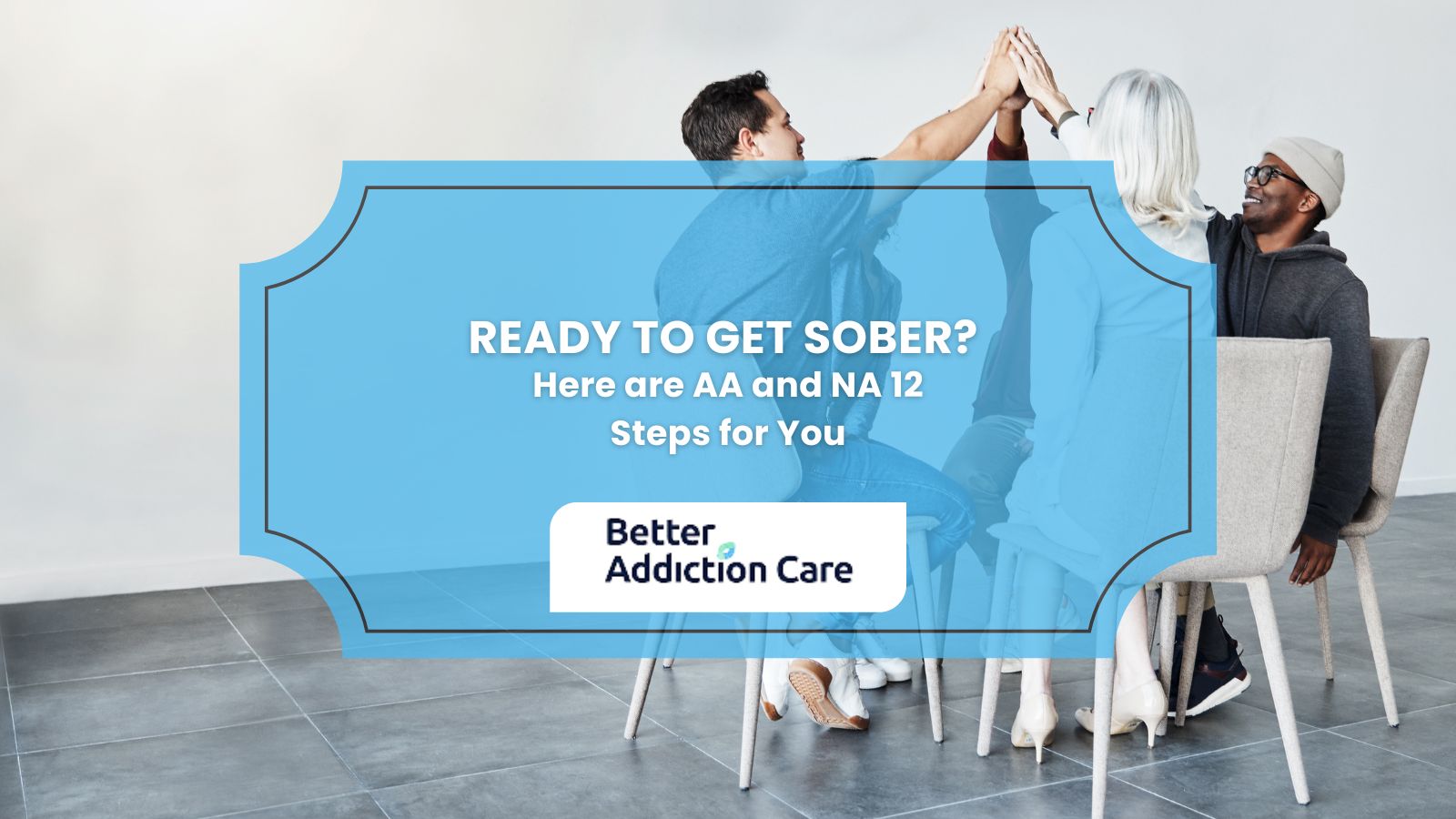5 Useful AA Tips for Newcomers
The 5 main Alcoholics Anonymous (AA) tips are being punctual to meetings, maintaining an open mindset, forming supportive connections, sharing experiences openly, and avoiding self-pity throughout the recovery journey. Punctuality builds trust and respect. An open mind fosters healing and growth. Meaningful connections provide essential support and reduce loneliness.
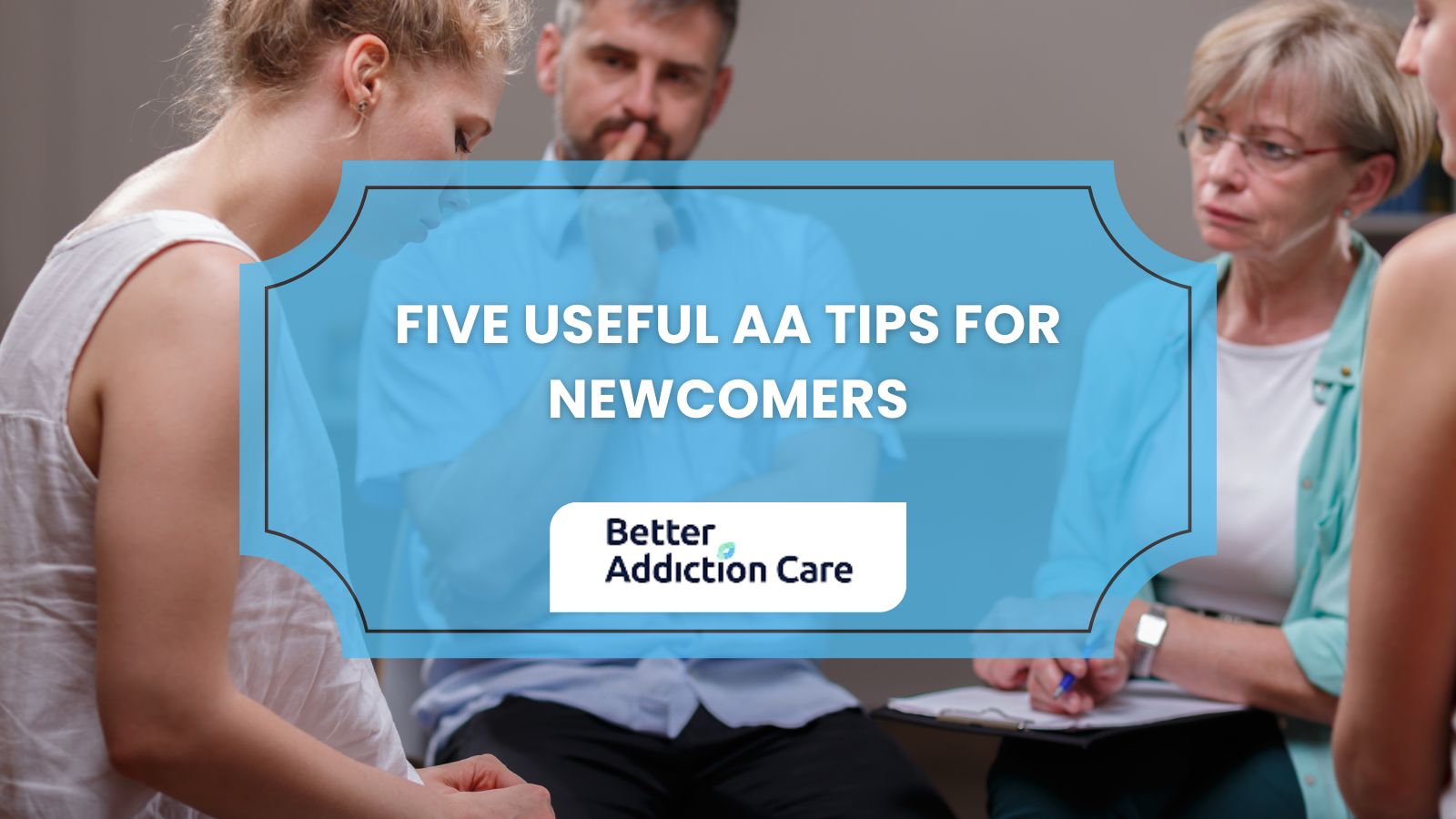
The 5 main Alcoholics Anonymous (AA) tips are being punctual to meetings, maintaining an open mindset, forming supportive connections, sharing experiences openly, and avoiding self-pity throughout the recovery journey. Punctuality builds trust and respect. An open mind fosters healing and growth. Meaningful connections provide essential support and reduce loneliness.
Honest sharing and active listening break cycles of denial and shame. Replacing self-pity with purpose shifts focus to empowerment. These strategies enhance the experience of first-timers and lay a strong foundation for successful recovery.
Alcoholics Anonymous (AA) is a worldwide, peer-led support group organization founded in 1935 to help individuals struggling with alcoholism achieve and maintain sobriety through its twelve-step program.
According to Kaskutas L. A.’s 2009 study, ‘Alcoholics Anonymous effectiveness: faith meets science, ’ the effectiveness of AA with rates of abstinence approximately twice as high among AA attendees compared to non-attendees. The evidence shows a clear dose-response relationship where increased AA involvement correlates with higher abstinence rates. Studies reveal that 70% of individuals who attend AA weekly maintain alcohol abstinence, while those with 27 weeks or more of sustained attendance reach 70% abstinence rates at 16-year follow-up.
This strong association between AA attendance and sobriety appears consistent across different populations and time periods, with multiple studies confirming these positive outcomes regardless of concurrent formal treatment.
What Are Five AA Suggestions For First-timers?
Five AA suggestions for first-timers include being punctual to meetings, maintaining an open mindset, forming supportive connections, sharing your experiences openly, and avoiding self-pity throughout your recovery journey. When attending your first Alcoholics Anonymous meeting, these strategies improve your experience and set the foundation for successful recovery.
To truly get the most out of your in-person or online AA meetings, it is encouraged that people share their experiences and truly dive into how they made them feel and act. These AA tips are not just great for making new friends and expanding your knowledge of alcoholism. They are also incomparable in success when it comes to staying sober.
Listed below are 5 AA tips for becoming a more active part of the AA group as a first timer.
- Be Punctual
- Keep an Open Mind
- Build Meaningful Connections
- Speak Honestly and Listen Actively
- Replace Self-Pity with Purpose
1. Be Punctual
Punctuality reflects respect for the recovery journey and the time of others involved. Arriving on time reinforces structure and discipline, essential for rebuilding a life shaped by chaos. Punctuality signals to the group and to yourself that you fully invest in change. Consistent attendance allows individuals to benefit from the full content of each meeting and builds trust with fellow members. Preparing the night before with adequate rest and clear intentions reduces anxiety and establishes a tone of seriousness and stability. This powerful habit strengthens self-control and supports long-term transformation.
2. Keep an Open Mind
An open mind clears the way for healing by removing barriers created by ego, fear, or past disappointments. Preconceived beliefs about others, the process, or personal limits stunt growth and reinforce patterns that lead to substance dependence. In AA, recovery unfolds in unexpected ways through relatable stories and respected individuals. Openness allows individuals to receive wisdom and compassion without defensiveness. Openness cultivates humility, a foundational trait in sustained recovery. Accepting unfamiliar guidance without resistance expands the capacity to change and deepens connection to the group.
3. Build Meaningful Connections
Recovery thrives in connection. Genuine relationships with others in the group transform loneliness into belonging, shame into understanding, and fear into mutual support. Initial discomfort with socializing exists, but reaching out or being emotionally available allows healing to take root in the community. Fellow alcoholics provide a depth of lived experience that professionals or distant acquaintances lack. Their insight creates emotional safety and encourages vulnerability. These relationships offer encouragement during setbacks, celebrate progress without judgment, and hold individuals accountable to their goals. Connection in AA is essential for emotional resilience and sobriety maintenance.
4. Speak Honestly and Listen Actively
Honest sharing breaks the internal cycle of denial, secrecy, and shame that fuels addiction. Verbalizing experiences, emotions, and thoughts reduces their power and invites clarity. Speaking candidly in a judgment-free space fosters self-respect and encourages others to share. Listening with full attention, without comparing or interrupting, teaches empathy and reveals shared struggles and solutions. Every story in the room, regardless of differences, contains insights that reinforce individual journeys. The balance of speaking and listening keeps individuals engaged, deepens understanding, and builds trust within the group.
5. Replace Self-Pity with Purpose
Self-pity distorts perspective, magnifies powerlessness, and delays recovery. It traps individuals in emotional paralysis and fuels the belief that change remains unattainable. Recognizing pain without sinking into despair opens the door to responsibility and empowerment. In AA, struggles hold value as tools for growth and service, not as sources of shame. Redirecting focus from loss to rebuilding creates momentum. Identifying personal patterns, setting realistic goals, and contributing to others’ healing shifts the mindset from victimhood to purpose. This shift nurtures self-worth and strengthens the desire for sobriety.
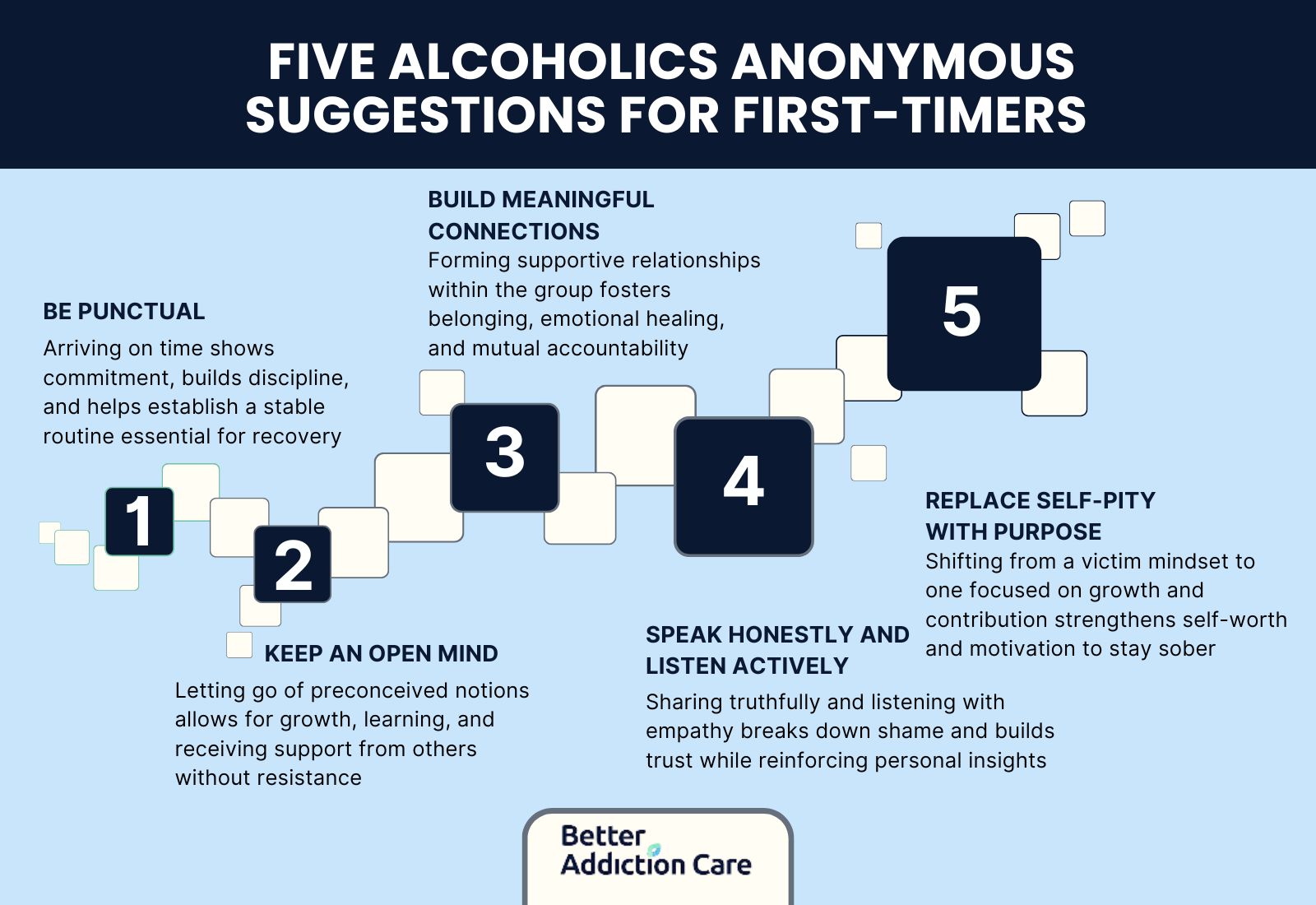
When to Use Alcoholics Anonymous Tips?
Use Alcoholics Anonymous tips when you reach a point where alcohol abuse becomes unbearable. Your relationships with family and friends suffer, your work performance declines, and your health deteriorates. A state, called "rock bottom," motivates individuals to seek professional help. AA organizations provide necessary guidance and support for those suffering from alcohol abuse.
The combination of external support and internal transformation proves effective for many seeking sobriety. AA meetings offer safe spaces to share experiences honestly and connect with others who understand your struggles. These tips help newcomers navigate their first meetings, establish personal connections, and work toward lasting recovery.
How To Find A Local AA Meeting Near You?
To find a local AA meeting near you, use the Alcoholics Anonymous (AA) official website, which offers a "Find a Meeting" tool that searches for nearby meetings by location, type (open or closed), and format (online or in-person).
The Meeting Guide app provides another convenient way to locate AA meetings on your mobile device, with features including name search and daily reflections. For those interested in virtual attendance, the Online Intergroup of Alcoholics Anonymous meeting directory lists numerous online meetings with details on meeting type, time, and regular schedules. Meetings happen daily across the country in various formats, including open meetings (Attendance is open to everyone) and closed meetings (for alcoholics only). Many meetings focus on specific topics like the 12 Steps, Big Book study, or discussion groups.
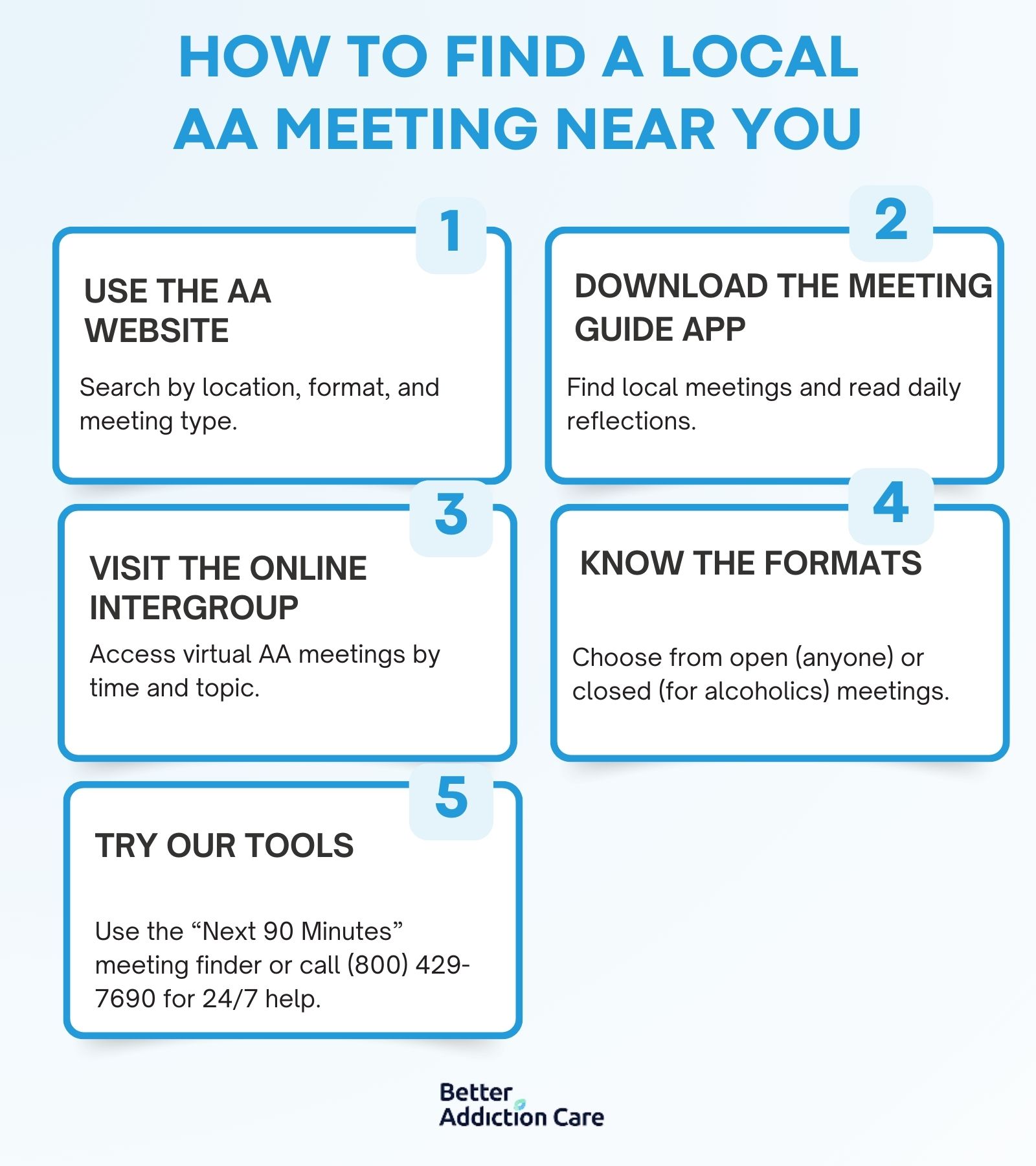
How To Find Help From Drug and Alcohol Rehab Facilities?
To find a local drug and alcohol rehab center, research facilities through online directories, healthcare referrals, or addiction helplines. Verify treatment coverage with your insurance provider and assess whether you need inpatient or outpatient care based on your addiction severity. Read reviews, check accreditation, and consider therapies that suit your needs.
Evaluate facilities by looking for qualified staff, evidence-based treatments, and aftercare support. Many centers offer free assessments to determine the appropriate level of care. Consider whether staying close to home or seeking treatment away from familiar triggers will benefit your recovery.
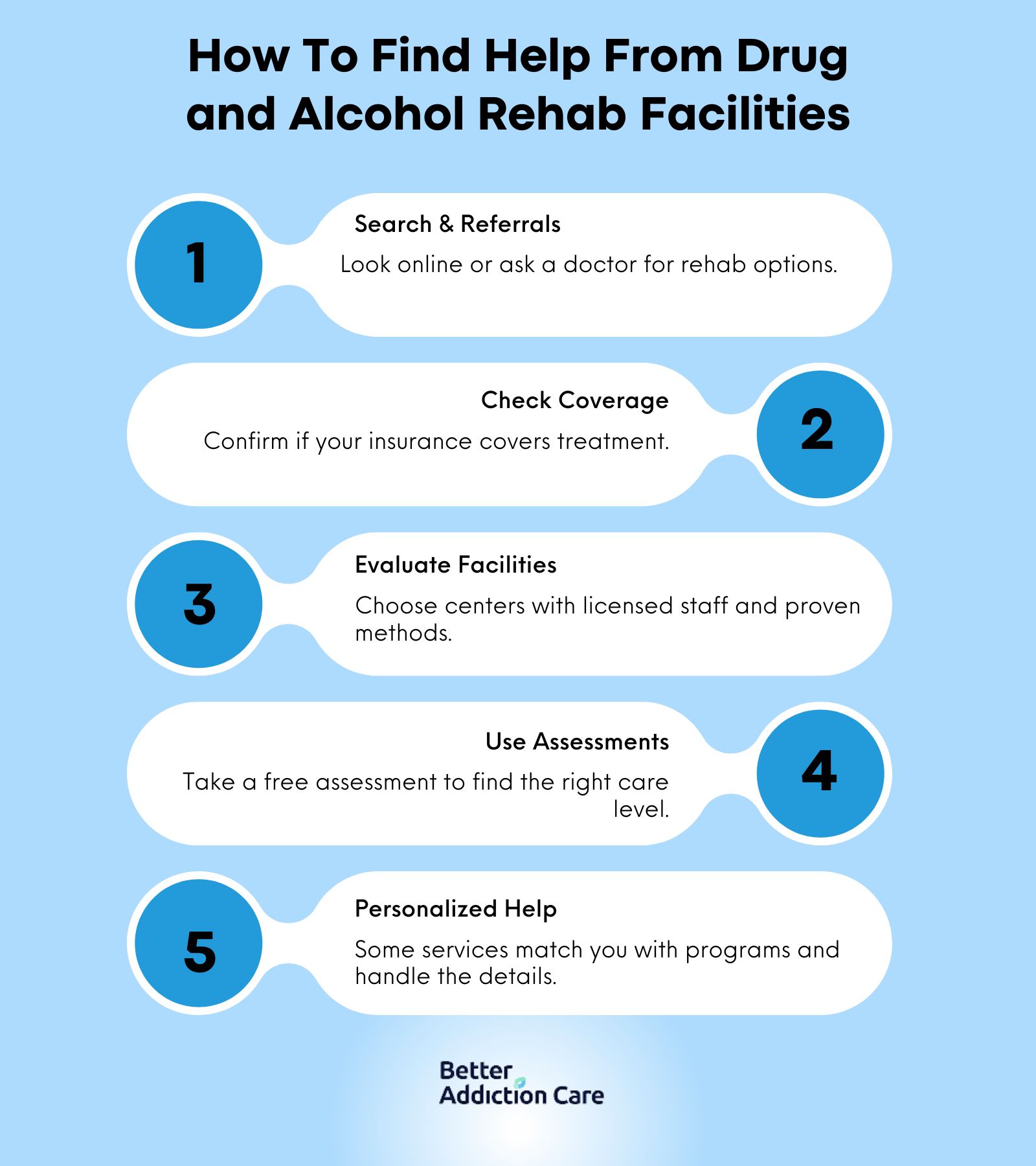
Our local drug and alcohol rehab facilities connect you with treatment centers that match your specific needs across the nation. Our addiction specialists work with you to find facilities that offer personalized treatment plans tailored to your substance use disorder, mental health needs, and personal circumstances.
Better Addiction Care's network includes both inpatient and outpatient programs, detoxification services, and specialized treatment approaches. We understand that taking the first step toward recovery feels overwhelming, which is why our team simplifies the process by handling the details while you focus on healing.
Whether you're seeking rehabs in California, Texas, or Florida, we provide confidential assessments, insurance verification, and placement in accredited programs nationwide. Contact our 24/7 helpline today to begin your journey toward lasting recovery.


